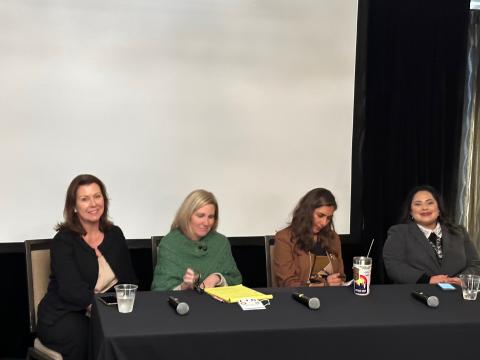Building the STEM Base for the Greater Good
It’s imperative to ensure the next generation of women is free to embrace and excel in science, technology, engineering and mathematics—for their sake and that of the nation, says technology pioneer Linda Gooden. For today’s youth, what’s next involves contributing to the greater good.
The foundation to build the next generation of scientists, technology experts, engineers and mathematicians must be set in elementary school, particularly if the nation is going to include women in its pool of qualified STEM candidates. The United States trails other industrialized nations in education, particularly in math and science. One set of results ranked the United States 35th out of 64 countries in math and 27th in science. SIGNAL Media and AFCEA International’s Women in AFCEA address the issue in a multi-month project to highlight women in STEM.
It’s imperative to ensure the next generation of women is free to embrace and excel in science, technology, engineering and mathematics—for their sake and that of the nation, says technology pioneer Linda Gooden.
“When you think about the pure potential of technology and becoming a part of that, there is a lot of excitement,” Gooden says, as though addressing young women. “Once you get through that physics course that you hate, it's behind you. Then you can start to think about what's next.”
For today’s youth, what’s next involves contributing to the greater good. “Many millennials I talk to are more socially conscious,” she says. “They do care about the environment; they do care about people. Technology will allow them to be a part of creating that better environment many are seeking.”
The foundation for courses in science, technology, engineering and mathematics (STEM) must begin with improving education for all students, she says. The United States trails other industrialized nations in education, particularly in math and science. “We’re working on a number of programs to try and get the trajectory moving in right direction,” Gooden, 63, says. U.S. students rank average when compared to peers globally, and fall behind many other advanced industrial nations, according to the Pew Research Center, citing findings from one of the biggest cross-national tests, the Program for International Student Assessment (PISA), which measures students’ ability in reading, math and science every three years. The most recent PISA results, from 2012, ranked the United States 35th out of 64 countries in math and 27th in science.
While more and more women graduate from universities with the required degrees to land STEM-based jobs, the race and gender makeup of higher education faculties does not reflect that of the student body, denying students access to mentors and role models while they still are in school. Among STEM faculty at colleges and universities in the United States, minority women are woefully underrepresented, accounting for less than 2 percent of the faculty even though they make up almost 16 percent of Bachelor of Science and 7 percent of Ph.D. recipients, according to the Society of Women Engineers.
Two reasons for the faculty disproportion come to Gooden’s mind. “From an economic perspective, if you are looking to make a difference and looking to contribute to the household wealth, and you are a well-educated female and African-American or Asian, if you go into industry, you can make considerably more money. A number of women have opted to go into industry instead of teaching for sheer economics,” shares Gooden, who retired in 2013 from Lockheed Martin Corporation as executive vice president for Information Systems and Global Solutions. She has an extensive background in information technology, cybersecurity, operations and finance and worked for more than 40 years in the technology field.
“If you look at many minorities, disproportionately you have first-generation college entrance, disproportionately you have less economic status, disproportionately you have less wealth. You can't discount the economic factor of leveraging the education differently.”
For some women, making financial ends meet at home means opting for industry-based careers, where salaries are higher. “Those are the things that take women out of the classroom, and we have to figure out ways to get them back into the classroom,” Gooden says. “Perhaps it's post retirement or at some point later in their careers that they will turn to the classroom.”
Additionally, there is the issue of the persistent pay gap for working women across the board, not just in STEM fields. Women earned 79 percent of what men earned in 2015, according to the U.S. Census Bureau, which based the statistics on the median salaries of all full-time workers. The pay gap is smaller in technology fields than in the general population and shrinks when salaries of entry-level employees are compared. “I hired more than 1,100 people a year—male, female and minorities—and when they came out of college and started working with us, they definitely received equal pay,” Gooden shares. The Obama administration has focused on the unequal pay issue throughout the president’s two terms, calling for an increase the minimum wage and laws to give women opportunities to learn how salaries compare to male peers.
Despite efforts to ramp up education, bring parity to the salary imbalance and cultivate digital and technology skills, the demand for qualified programmers still outpaces supply. “When I got into computing in the early ’70s, we were in awe of computers and the power they held to change society and change our lives,” Gooden says. “Now, millennials in particular, have grown up with technology and it doesn't hold that same awe that it did for us. We have to find ways to inspire them the way we were inspired."
It’s not a who that inspired Gooden the most, but a what. “I was really inspired by the computer itself—its power to change people's lives, its power to change society, its power to change the way we work and play. Technology has really come of age and I feel like I've always been apart of it and I'm hoping that I will always be a part of it. I was in STEM before it was called STEM,” Gooden quips. “Then, it was called math and science."
Her career centered around the field of technology, computer technology specifically. The work bled into her personal life. “I always loved having computers, having the latest gadgets and I've always liked fast cars because of all of the technology that helps them operate,” says Gooden, who enjoys her latest toy—the 640 horsepower Cadillac CTS V, which can travel 200 mph and can be taken for a spin on professional racetracks. Retirement for Gooden does not mean slowing down. She serves on several boards including General Motors, The Home Depot and the American Heart Association—and chairs AFCEA International’s Board of Directors. But it has altered her reading selection. Her career was punctuated by reading books on leadership and industry management—now she enjoys the mysteries of Grisham and Patterson.
She did not allow hurdles she encountered as a woman breaking into the field turn into barricades, she says. “There were so few people in the field that I think the barriers were understanding the technology, making sure that you could actually accomplish the task,” she offers. “But it was one of the few fields that was so new, it was such a green field, that a promising opportunity largely existed for pretty much anyone who decided this is what they wanted to do.
"Because we have raised a generation of digital natives, we as an establishment—particularly in the education arena—have to find ways to get back that excitement," Gooden continues. "Today, kids take that for granted. Now we have to find ways to show them how to use technology to do things to help make the world truly a better place—in terms of personalized medicine, in terms of making sure food is distributed ... to reduce hunger, and in ways that we can communicate globally more effectively."
Join AFCEA now, where for $50 a year, you can make a difference in the STEM community, for women, students and for national security. Read about AFCEA’s programs for women in STEM.
Join us for AFCEA's first women's panel. "Why Are Women Leaving STEM?" begins at 1:30 p.m. on August 3 in the Engagement Theater at TechNet Augusta. The conversation continues during a networking reception immediately following the session courtesy of panel sponsors Walker and Associates and Ciena.




Comments